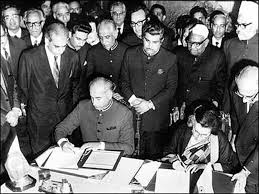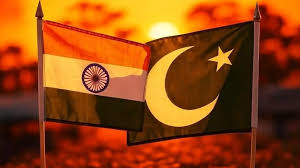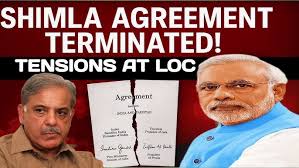
The Shimla Agreement 1972 has been suspended by Pakistan on 24 April 2025 in retaliation for India keeping the Indus Water Treaty in abeyance after the Pahalgam terrorist attack
Shimla Agreement Suspended
On 22 April 2025, 26 Hindu tourists were singled out and killed by a Pakistani-trained terrorist in Pahalgam, Anantnag. The Indian Government has taken a stern stance against Pakistan. India has put the Indus Water treaty in abeyance.
In retaliation, Pakistan announced the suspension of the Shimla Agreement of 1972 in abeyance on 24 April 2025, along with the suspension, trade with India and land and air routes were closed. This has raised concerns about the future of peace and stability in the region. Especially in the Line of Control in Jammu and Kashmir
Shimla Agreement
The Shimla Agreement was a peace treaty signed between India and Pakistan after the Indo-Pak war of 1971. This was a bilateral agreement between India and Pakistan signed by Indian Prime Minister Indira Gandhi and Pakistan President Zulfikar Ali Bhutto on 2nd Jul 1972 in Shimla, Himachal Pradesh.
It came after India supported Mukti Bahini, who were fighting Pakistan state forces to liberate Bangladesh. The accord aimed to normalise relations, end hostilities and create conditions for peaceful coexistence and bilateralism
To achieve the objective of peaceful coexistence and promotion of harmonious relationships and the establishment of durable peace in the sub-continent, so that both country can devote their energy and resources to the welfare of the people. Both agreed on
- That the principles and purposes of the Charter of the United Nations shall govern the relations between the two countries.
- That the two countries are resolved to settle their differences by peaceful means mutually agreed upon between them.
- The countries agreed to respect each other’s territorial integrity, political independence, and non-interference in internal affairs.
- The 1971 ceasefire line in Jammu and Kashmir was re-designated as the Line of Control (LoC), with both sides committing not to alter it unilaterally, irrespective of differences.
- The agreement called for resuming communications, travel, and trade links, aiming to restore diplomatic and economic relations.
- India agreed to release over 93,000 Pakistani prisoners of war, one of the largest post-war releases in history.
Potential Implications of Suspension of the Shimla Agreement –If it is to be seen, there would not be much of an implication, as Pakistan has violated this agreement for a long time. LOC exist as it is, Pakistan has violated the agreement in the 1984 Siachen incursion, the 1999 Kargil War, and cross-border terrorism has increased. Pakistan has voiced the Kashmir issue at different international forums. So it is not going to affect India’s health in any way however, it would be easier for India to expose Pakistan. However
- Abeyance of the Shimla agreement will allow officially to take issue with a third party without any binding. So issues will be internationalised,
- Proxy warfare will increase on the LC and elsewhere.
- There will be increased diplomatic and military tensions. The breakdown in bilateral agreements may affect cooperation in regional organisations like SAARC.
- It will derail developmental and democratic consolidation efforts in J&K, which have sped up after the abrogation of Article 370.
- The suspension can disrupt supply chains, affecting businesses that rely on imports and exports between the two countries
What Measures Should India adopt to Tighten Security Along the LoC after this heinous act by terrorists?
- Integrate real-time satellite imagery, UAV patrols, and ground-based radar data for seamless monitoring
- Install anti-drone radars and Artificial Intelligence-based detection systems to counter growing drone-based activities
- Refine multi-layered counter infiltration grids involving BSF, VDF, and the intelligence unit
- Develop Community-police and military collaboration to build a first line of Alert
- Empower Village Defence Committees in the Valley with proper arms training, intelligence gathering roles and an early warning system.
- There is a need to replace traditional barbed wire fences with modern sensors, laser and seismic detectors
- Accelerate fencing in vulnerable sectors such as Gurez, Uri and Poonch, where infiltration routes are active
- Hinter land should not be left unguarded. Rashtriya Rifles must move into this area, which has been vacated after the abrogation of Article 370.
Conclusion
The suspension of the Simla Agreement provides India an opportunity to recalibrate its security and diplomatic strategies. Strengthening LoC defences and international alliances is crucial. India can leverage this incident to highlight Pakistan’s role in terror financing. It also strengthens the case for Pakistan’s re-listing in the Financial Action Task Force (FATF) grey list.



Thanks
Look in to it
UGC NET